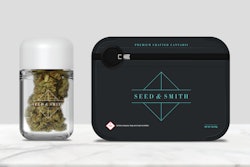Keren Sookne, director of editorial content for Healthcare Packaging and PMMI’s in-house healthcare packaging expert, tackles the always provocative topic of cannabis and cannabis packaging on UnPACKed with Healthcare Packaging. With a new administration and Congress, will cannabis laws ease up nationally for medicinal and adult use or get tougher? How has cannabis use increased during the pandemic and what are we seeing in terms of new products, packaging and packaging materials?
For more information on all things cannabis access the 2021 Packaging for the Cannabis Market Report from Packaging World.
To subscribe and find more unPACKED podcast episodes, visit pmmi.org/podcast.
 | Read the full transcript below |
Sean Riley:
Hi and welcome to UnPACKed with Healthcare Packaging. I'm your host, Sean Riley. While we have talked with our guest Keren Sookne before, this is the first time we are doing it under the Healthcare Packaging Magazine brand. And what better topic to kick off the series than cannabis. Will cannabis laws ease up nationally for medicinal and adult use or become tougher? How has cannabis use increased during the pandemic? And what are we seeing in terms of new products, packaging, and packaging materials? Let's find out. And we're excited to welcome back to the podcast, Keren. Welcome back to the podcast, Keren.
Keren Sookne:
Thank you. Thanks for having me Sean.
Riley:
Always my pleasure. So one of the aspects of the new administration that's for obvious reasons, not going to get a whole lot of mainstream press right now with everything else that's going on in the world, revolves around cannabis and legalization and all things like that. So, while its legality has come a long way in terms of what you can get in a state whether adult use or medicinally, there's still not a federal plan in place here in the U.S. So, now that the Senate races have been decided and we have a new president in place, is it more likely that cannabis access will expand now that the Senate has changed in Biden's office? Could you speak to that? What do we have to look forward to from that point of view?
Sookne:
Sure. So something just to back up to the end of last year in 2020, the House had passed the MORE Act which was really historic in that it was written to remove cannabis entirely from the Controlled Substance Act. And so that's the biggest step forward that we've seen on a federal level. It would take time for regulations to be developed and states could choose how they regulate cannabis, but that was just a huge step forward. Now that was passed in December and ended up dying when the Senates adjourned for the year. But already this year we've had some motion Rep. Steube from Florida, who himself is a Republican, he filed a proposal to remove marijuana from Schedule 1 to Schedule 3 of the Controlled Substances Act in January. But as much of that is a small step forward, but at least at the time of this recording there've been recent comments from a few different reps and senators including Chuck Schumer say that whatever bill is filed in the near future it's likely to include components of multiple pieces of legislation from the last Congress.
So they're actively merging several bills so that they're not piecemeal making all these little changes. So, I think that's definitely something to look forward to. But I think it's also really good to acknowledge that as important as these bills are these former and existing laws have really targeted certain communities and ruined lives. And in the past couple of years with state legalization wealthy investors have come in and started profiting. And so while they won't undo the wrongs that these laws have caused, social equity programs in the states are going to need to play a huge role and they have to basically improve a lot from where they stand right now.
There's still lots of predatory investors, unsolved applications, and really high tax rates. There's all these factors contributing to this lack of success in promoting minority owned business ownership. And so, I don't want to downplay the importance of removing cannabis from the Controlled Substances Act, but there'll certainly have to be other legislation taking place to help communities along and really push us forward as a society.
Riley:
The last time that we talked about cannabis on here was with one of your colleagues about a year ago. Can you talk about perceptions culturally among the populous. Experts have come around on cannabis as a safe alternative to "harder substances or recreational." But how about the general population? What are they thinking?
Sookne:
That's a great question. There was a recent Gallup poll that said that more than two thirds of Americans now support the legalization of cannabis. So whether you believe in states' rights or you're more of a federal focused person, in either of those cases the majority of the people have spoken and most of this country wants cannabis to be legalized. And so, I just am looking forward to these laws that will represent the will of the people.
And then also I think that once we loosen up the laws a little bit there's going to be so much progress in terms of medical research. And we all want our ill family members to have every tool at their disposal for when they're sick. And so, there's just so much possibility with this plant that we haven't been able to do enough research on so many different compounds because of the restrictive laws. And so it's really going to open up so much in terms of medical innovation. And so this is what the people want basically.
Riley:
Right. That's also interesting because that's the thing that doesn't really get talked about that much. Because it's not federally "legal" it's hard to have places where you can test it, correct? To find out medicinally how it can treat an illness or symptom. I don't think there's many at all, right?
Sookne:
Well, I think the main problem at least historically was that all marijuana for research in the U.S. could really only come from one university. And so, I just think that we've been hampered by the fact that companies and growers have created such amazing products and we have not been able to test those on diseases and illnesses yet. Once we make it easier to expedite research applications and grant easier access to cannabis for researchers, everything is just going to really improve in terms of our medical research.
Riley:
Yeah. It did surprise me when I came across that, that even though it is legal in different states,they can't research it. They can just say, "We think it will be good for this, this, and this." Which just seems so not American when it comes to medicine.
Sookne:
Absolutely. We want our freedom and we want it now.
Riley:
What are we seeing on the consumer side? I know you just said that two thirds of the people are for it. Are they educated on the scope of the offerings? How do consumers view this beyond what they used to see back in the '60s and '70s.
Sookne:
Right. Where you would just get whatever your dealer had available.
Riley:
Exactly.
Sookne:
Things are astronomically different from those days. Consumers are highly educated. They want to know certificates of analysis or as they're known as COAs. This can be a challenge for brand owners in terms of educating their customers on these things or answering those questions, particularly where packaging is quite small. So you have to rely on your social media, stickers that you're adding on after that primary packaging, things of that nature to get all this information across. Another issue that brand owners have to face is that consumer behavior as well as dispensary policies have changed so much in the last year, since March when the pandemic broke out. Consumers aren't necessarily going to go into this dispensary and browse.
Riley:
Interesting. So it's gone from not being legal at all to almost a form of e-commerce where other than the curbside pickup part of, it you're doing most of it online.
Sookne:
Right. Certain markets differ but definitely a lot of it has become either completely e-commerce or as close to it as possible while still picking up at a brick and mortar store.
Riley:
Very interesting. Well then what have we seen in terms of products or deliverables? Again, we touched on the typical use of marijuana is smoking, or I guess now vaping or edibles. But in terms of products or deliverables and how it can be processed, what are we seeing out there now?
Sookne:
Yeah. So I believe it was in seven different states including California and Colorado and Michigan there has been a rise in edibles. I mean, this I think just makes common sense, they're discreet and we're currently in a pandemic with a respiratory disease. And so, some people are trying to limit how much they're smoking or inhaling things. Also more and more seniors are interested in cannabis. And so where they may be a little bit intimidated by smoking something you have a low-dose cookie or a gummy, any kind of edible as well as tinctures that you can just put under your tongue. It's a lot less intimidating than smoking, especially if you already have lung issues.
The other side of that, there is a lot of growth but it can be a risky game for the producers. Blake Patterson who's CEO at MarketHub back in 2020 said, "Big players, clients of his like CVS they got into CBD but they prefer to stay on the topical route for now." So that's patches and balms and things of that nature. Retailers are really nervous about injectables just because there's still this lack of clarity from the FDA. And so, it's nerve-wracking to open up the channels to ingestibles when you don't have this clear direction from the FDA that it's
Riley:
Interesting. But why would that be the case with a nutraceutical where you see that they carry vitamins and things like that that might not necessarily go through the FDA?
Sookne:
Yeah. I think a lot of that has to still do with the stigma and the fact that even if CBD is not necessarily cannabis that has psychoactive properties, cannabis is still on the Controlled Substances Act. And so I think, maybe it'll open up once it's descheduled or removed off that list.
Riley:
Makes sense. Packaging has always been tricky for cannabis. Especially when you get into situations where you're trying to balance making them child safe, but still able to be used. If it's a person dealing with arthritis a child safe package is not the best option all the time. Plus you need it to be appealing and something that's engaging for the retail or the consumer to say, "I want to take a look at this." So with that mind, could you give us some things that are happening with packaging?
Sookne:
Sure. The industry as a whole is definitely still looking for more eco-friendly packaging. But as you said, it's really hard to balance these child-resistant requirements with this desire for minimal packaging. Especially when brand owners are smaller and have smaller volume orders, you just can't get this customized minimize packaging that really suits your product. You have to stick with what's off the shelf and what's off the shelf maybe an over-packaging situation for you. So it's really tough.
Sookne:
Suppliers are coming out with eco-friendly packaging. There are certainly recyclable options, there are glass options, there are paperboard options which include child-resistant features on them. And so, there's certainly are options there but I think that there's still definitely more innovation that needs to take place in terms of that really eco-friendly right sized packaging in materials that brand owners want. One thing that I thought was really unique was Melissa Griffen, one of our contributing editors, covered this bespoke packaging system for flower that preserves terpenes.
This brand owner, it was called Vireo Health, and their supplier eBottles 420 created this basket that fits inside the jar lid. And they insert a blend of terpenes into that basket in the packaging.
The company describes it is that these terpenes that are included in the lid basically will resupply the headspace equilibrium, meaning that the terpenes in the flower won't have an equilibrium drive to fill that airspace in the jar. That ultimately helps to preserve the terpenes that are in the product during storage. So I thought that was really a pretty unique package compared to most of the products I've seen for flower packaging.
On the other hand we've also seen Sana Packaging, they've created systems from reclaimed ocean plastics. And so, the unique thing that they're doing there is they're working with this company Oceanworks to ensure that the materials for a given package are pure. So even though they're reclaimed ocean plastics they're solely HDPE or solely polypropylene. And so, because these are pure materials they can be recycled. Whereas if you take a mixture of ocean plastics and you have no idea which plastics are in there, those couldn't be recycled in our standard recycling infrastructure.
So it's nice to see strides being made where you're finding that these reclaimed ocean plastics are now creating packaging that can then be recycled back into new products. It's definitely we're still in the middle of this chicken and egg scenario where we don't necessarily have this really steady supply of pure reclaimed plastics. And so how can we create demand for them if we don't know the supply? But then how can we create this steady supply when we can't forecast the demand? And so, definitely it's still this growing pain era where we have to figure out how to balance supply and demand of something that hasn't really been on the market for very long.
Riley:
Interesting. Well then how about anything else to put a button on the packaging end? Is there anything else on the materials side that we haven't touched on?
Sookne:
Yes. I've heard rumblings that some brand owners want to be able to package cannabis products in hemp-based packaging. And so, cannabis is one of the few natural products that could in so many words be packaged in its own material. We know that hemp is quite strong, it's biodegradable. Maybe one day cannabis and CBD products join the ranks of bananas and paper and they can be packaged in their own material.
Riley:
Yeah. And with shelf life— I'm sure we might get to a point— but we're not at a point where you're buying huge quantities of cannabis that you're going to have to sit on a shelf for long periods of time. So if it is something that you're going to have for a couple of weeks or a month, a hemp package would be ideal because it's all biodegradable.
Sookne:
Absolutely.
Riley:
Perfect. I thank you again, this was a great talk. I learned things, hopefully the people listening are going to learn things. Everybody always likes to hear about this because it's not often that you get a new product that can be packaged and processed and all good things like that. So I want to thank you again for coming on here with this Keren.
Sookne:
Absolutely. Thanks for having me on.
Related news:
Packaging Technology Keeps Vireo Health’s Cannabis Flower Flavorful and Potent Longer
Setting a Design “North Star” in a Fragmented, Emerging Market
Retail and E-Comm: 4 Cannabis Considerations in Uncertain Economic Times






















